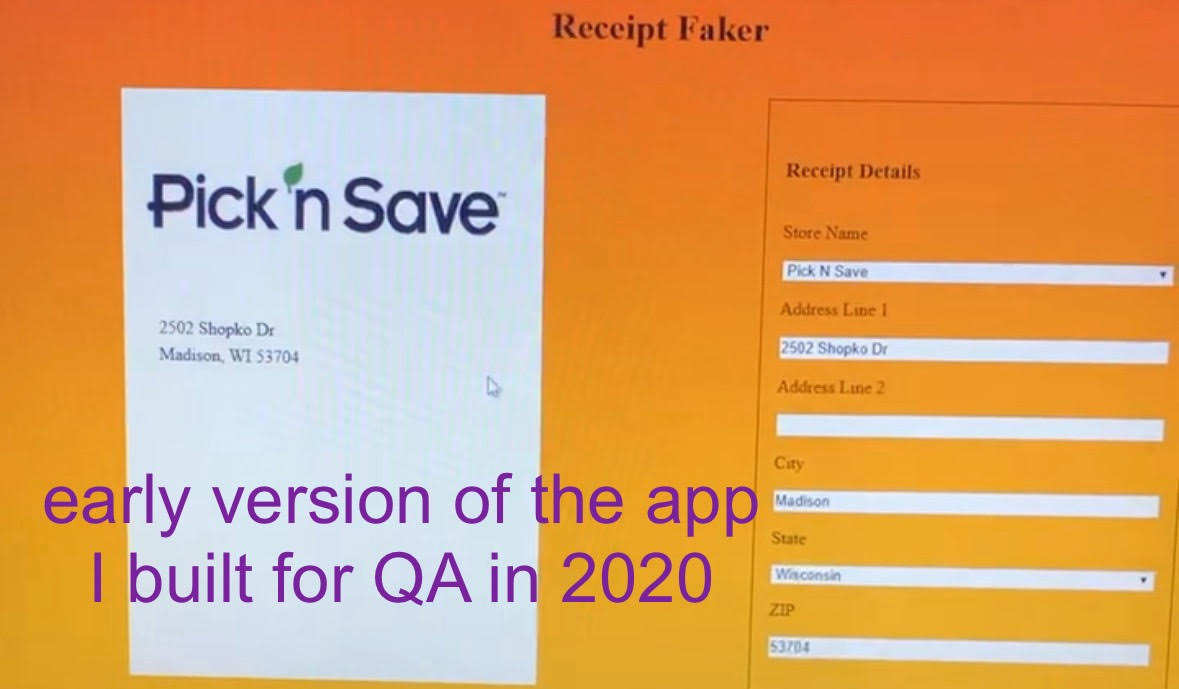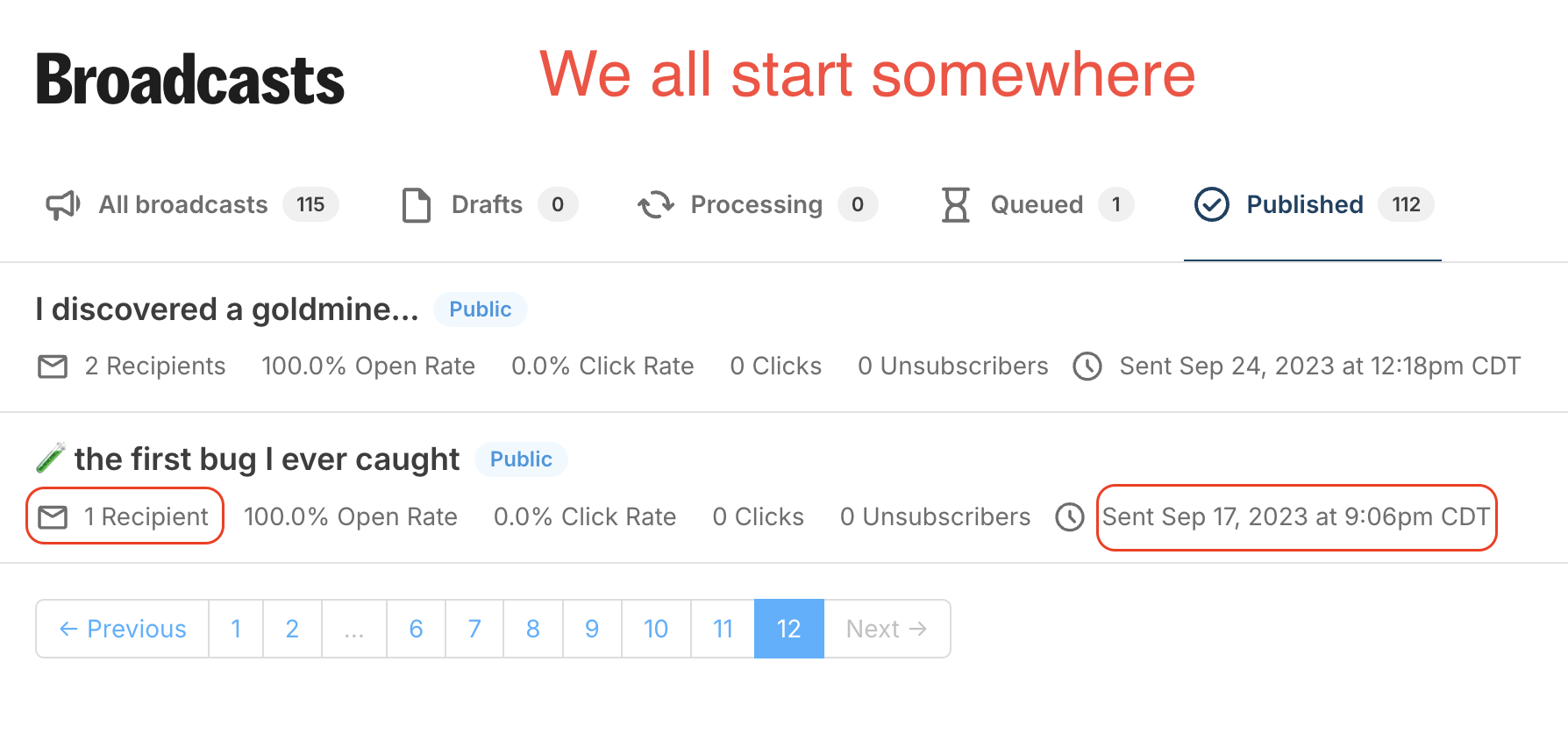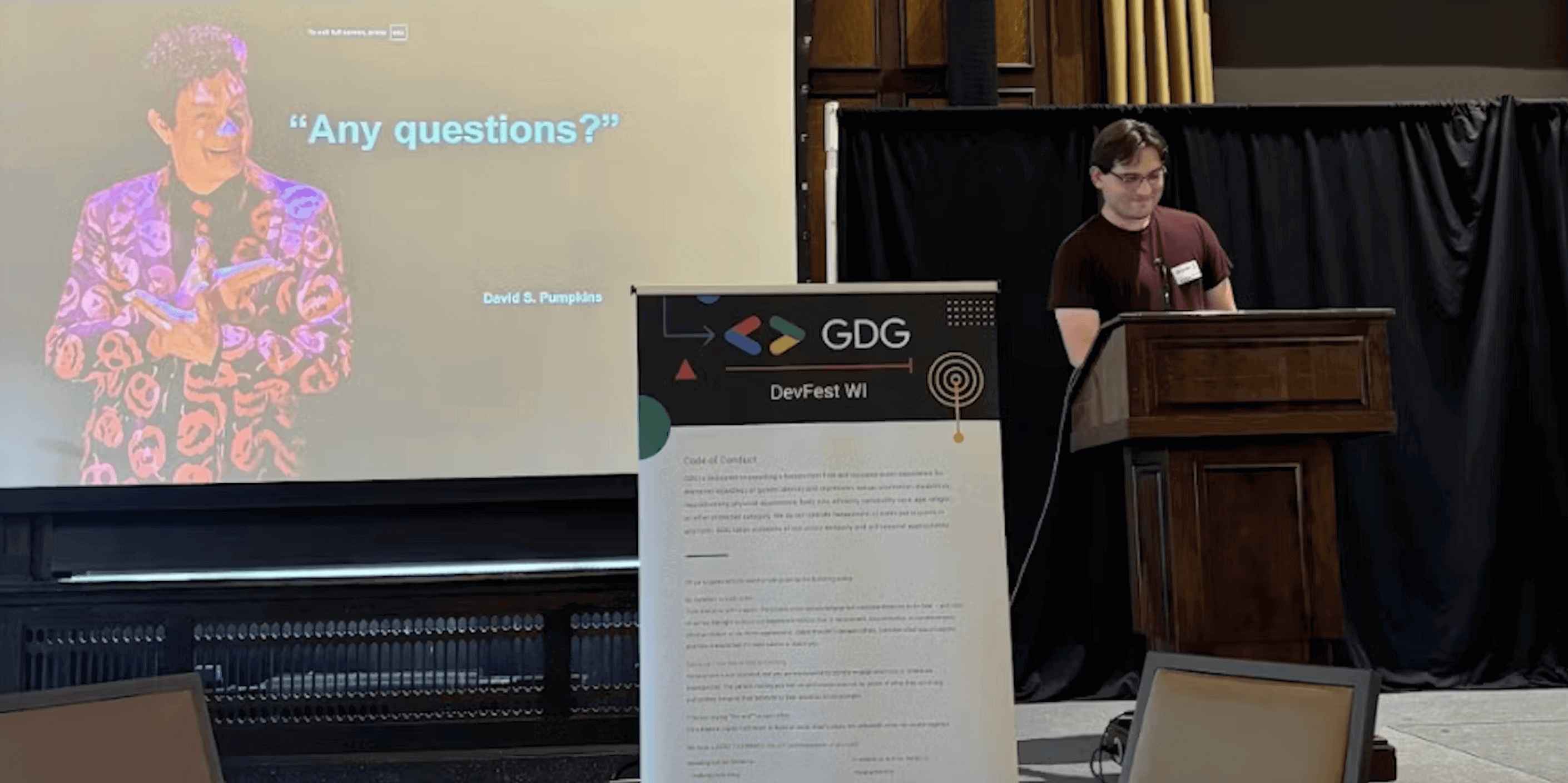When Worlds Collide: job-hunting like an entrepreneur
November 7, 2024

I'm a QA mentor on ADPList, QA blogger, job-hunting coach, and educator.
I create mini-courses, contribute test automation to open-source projects, and build apps for students, mentors, and myself. Learn more on my website, or connect with me on X, LinkedIn, or ADPList for a free mentoring session.
Getting my first promotions in tech

I started in QA back in 2020, right after Wisconsin was locked down due to COVID.
My first job in the Engineering side of a tech company was remote (I was in-office on the Support team in a hybrid capacity before this).
During my time in the QA department at this mid-to-late-stage startup — let’s call it “job #1” — I was given 4 pay increases and a phat stock options bonus, all within 2 and 1/2 years.
What I learned during this time was I could get rewarded for doing what came naturally to me — sharing my knowledge through writing and mentoring — while ensuring that I performed my core responsibilities at a high level. I later turned these insights into a free workbook that I give away to new newsletter subscribers.
By the time I left this company, I had onboarded 6 QA Engineers and co-founded a QA Automation Apprenticeship Program, which resulted in 2 analysts transitioning to automation roles in the team.
I’d also authored over 100 articles in the internal wiki as a way to “upload my brain” for the QA team to use when I was busy or out of office. It was also how I avoided answering the same question or teaching the same procedure for every member of our [eventually] 50-person QA team.
Now, I think some context is needed for you to understand why I was doing any of this in the first place.
Before QA, like I said, I was in Support. But before that? I was in customer service and low-paying grunt jobs all my life:
- Bartending
- Grocery delivery
- Overnight box-packing
Stuff like that. I eventually got tired of all that and wanted a better life for myself, so I learned to code using free online resources like freeCodeCamp and tried to become a web developer. If you want the full story, I’ve got a blog post about it, but I won’t spend time on it here.
Suffice to say, I managed to get in at the ground floor of a tech company and found my way into QA with a mix of luck and preparation. I wasn’t going to let this chance go to waste. I was determined to make it near-impossible for them to want to fire me.
I even used that web development knowledge to build the QA team an app that would automate test data generation for some visual testing scenarios. If what my colleagues say is true, it’s still being used at that company today.
But before I ever got my first role, I’d already learned the value of networking, building in public, and other things that have become more popular lately. A lot of it comes down to using writing and communication skills to educate others. And being someone people want to learn from.
I didn’t know until later that this would be extremely valuable for job-hunting in tech.
Writing to find my community

After I left that first job, my next job challenged me to my core.
I confronted a serious case of imposter syndrome when they asked me to do something my first job had never expected me to do: make my first test automation solutions, effectively by myself.
They gave me a mentor with 12 years of experience, but he was only there to answer one-off questions, not tell me how to do the job.
At my job #1, the most advanced test automation task I’d ever done was inside of a solution someone else had already built. I was just adding new test scripts. Nothing crazy.
But because of job #2, I gained considerable confidence in my own abilities. I built a test automation solution for a mobile app and a desktop app, mostly through trial and error, with the help of AI chat (mostly Gemini and ChatGPT) to ask questions about technical details.
I can now confidently guide others on how to do the same. I’m even launching a course on November 29th that shows you how to build your own Playwright project for the Amazon website using Cursor’s AI chat, among other useful skills. There’s a waitlist.
I credit this job with giving me the inspiration to finally go out into the world and find ways to help in the QA community. Before that, I thought of myself as an “advanced junior” who couldn’t do much on his own.
But once I stumbled upon this guy named Dan Koe who taught people how to start education businesses on the internet by writing content and building info products, I felt like it would be a great creative outlet for me to teach more people what I’d learned.
So I started following people on Twitter (before it became 𝕏) who were building these kinds of online businesses. This pocket of Twitter was called “Money Twitter” because it was full of entrepreneurs. I learned how to write good content by imitating my favorite business owners and buying their inexpensive 1:1 coaching calls and digital products.
I built an audience on Twitter from 0 to 500 followers, then pivoted over to LinkedIn to write the same kind of content, which worked amazingly, since most content on LinkedIn is poorly formatted or dry. The way people write on “Money Twitter” is more “punchy” and hooks attention better than most content I read on LinkedIn, so naturally, writing this way got better engagement, and eventually my account ballooned from 600 to 5000+ followers. To be fair, there are more QA people on LinkedIn than on Twitter, as far as I can tell, so it was easier to grow there anyway.
In the process of building an audience, I started a newsletter to funnel that traffic to, which now has almost 500 readers who consistently read my daily emails.
All of this writing got me plenty of attention on LinkedIn — and some trolls — but it also led to unexpected opportunities showing up in the form of DMs from founders, business owners, open-source developers, and people with opportunities I didn’t even know existed. Turns out, the more you get noticed, the more opportunities “magically” find you. It’s a numbers game.
A lot of this growth didn’t happen just because I was writing, though.
I gathered social proof in the early days before any of this took off.
Mentoring on ADPList

That “social proof” — which is a fancy way of saying “other people vouch for you” — came from me giving away free mentoring calls on the ADPList platform.
Two friends of mine from when I worked at job #1 were product designers, and they both mentored on ADPList. I’d seen them post on LinkedIn about it in the past, long before I considered doing it myself.
I’d recently reconnected with 1 of them and they suggested that I try mentoring on that platform.
”But it’s mostly for designers, right?” I thought.
I did some digging and found out there were already some QA professionals mentoring on ADPList.
So in December 2023, I hopped on, built my mentor profile, and I started getting the occasional booking from people who found me.
I started noticing people mostly found out about me from LinkedIn, so I started posting about my mentoring services on LinkedIn as a way to proactively attract more potential mentees.
This worked, and at the time of writing this, I’ve logged 40 mentoring calls on the platform. Made plenty of new friends doing it, too, including the founder of ADPList himself.
Even by the time I’d had my 10th call, I started to notice people were more concerned about job-hunting advice than they were about QA advice. Sure, I got plenty of QA questions, but almost everyone wanted to know how to land their next role. Turns out, lots of people don’t love their jobs or they want to break into tech.
I didn’t consider myself an expert, but I realized I’d been fortunate enough to land a role in the post-COVID job market, which was considered difficult by most people I talked to at the time. I don’t believe in luck without preparation, but landing 1 job in a tough market could still be mostly luck.
Launching my playbook
But then I landed job #3. I couldn’t ignore it anymore. 1 job in a tough market could be luck, but 2 jobs in a tough market?
I knew there had to be something I was doing differently that was working better than whatever everyone else was doing. I started to reflect on what I did to land jobs #2 and #3.
It turned out I had a lot of “unconventional” strategies I was using.
This whole time, I thought I was doing stuff everyone else knew about, but all along, I was inside my own little bubble.
I decided to document all of these strategies in the form of a digital product I could share.
In March 2024, I launched QA Job Magnet, my playbook for landing a job in tech, tailored to QA folks.
It’s got 6 chapters:
-
The “Job Magnet” Theory: Understanding that job applications and interviews are just the tip of the iceberg.
-
Refining Your Digital Persona: Crafting an online presence that showcases your professional value.
-
De-risking Yourself: Demonstrating reliability and reducing perceived risks for potential employers.
-
Building Authority: Establishing yourself as an expert in your field.
-
Win-Win Networking: Creating mutually beneficial professional relationships.
-
Breaking the Rules: Employing unconventional tactics to gain an edge in the hiring process.
Every now and then, I’ll learn something new about job-hunting and add it to the playbook.
It’s a living repository for what I know about effective job-hunting.
When I first launched it, it was a scrappy bullet-pointed list of strategies, but now? It’s a well-formatted, organized workbook with homework assignments, videos, and more.
But you might still be wondering after hearing my story:
What does it really mean to “job-hunt like an entrepreneur”?
Winning Attention.
That’s what it means, in a nutshell.
Entrepreneurs understand that it’s not all about product. You have to do marketing, too. And sales.
Obviously the product needs to be good, but if nobody knows about it, it might as well not even exist.
You’re offering a service, but you’re selling it as a product: you.
I’m Steven Boutcher. My services include testing, test automation, web development, etc. But ultimately, I’m selling myself, a product who is more than the services I offer.
I already have a brand, whether I like it or not. It’s whatever people can find out about me on the internet: my LinkedIn profile, my GitHub repo, my resume…
But people will make assumptions about me based on the information available to them. So I need to give them the information I want them to find. And I need to make it easy for them to find and consume it.
Entrepreneurs know they need to market their product to the right audience and be good at converting their audience to paying customers.
You need to do the same when you’re job-hunting:
- build a world of content, projects, and social proof
- attract recruiters and hiring managers to your world
- when they reach out, engage with them, and make it easy for them to schedule an interview with you
You’re flipping the script.
While job-hunters typically chase opportunities, entrepreneurs proactively attract opportunities through world-building, community engagement, and marketing.
Obviously, traditional job-hunting strategies still help. Don’t stop applying to jobs.
But that’s no longer your main focus.
You’re going to think long-term now. Doing this “world-building” thing will make you hirable in any future market, because you will no longer be invisible.
There’s no shortage of opportunities. That’s not the problem here.
The reason the market is so hard to navigate right now is because it is highly competitive, but only in terms of the resumes you’re competing with.
Lots of people look better than you on paper.
But most people have no clue how to market themselves. They stop at a good resume and GitHub portfolio, and expect people to somehow find those in a sea of resumes and GitHub portfolios.
But now you know better. If you want to beat a more competitive candidate, you don’t have to be better than them.
You just have to get noticed before them.
Winning attention will become the best way to remain hirable in the 21st century, but thankfully, you’re still early to this trend.
Most people have no clue this is a thing. Do with that information what you will.